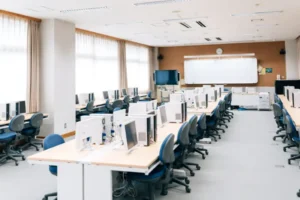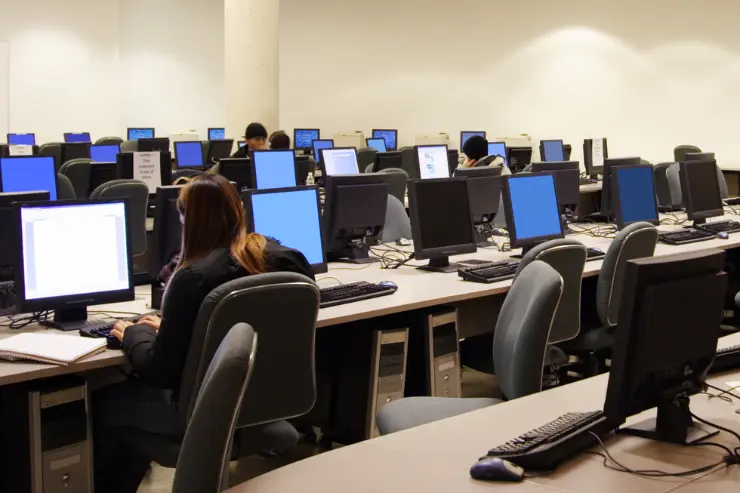Skill Lab in CBSE Schools: The introduction of composite skill labs in CBSE (Central Board of Secondary Education) schools marks a significant step towards revolutionizing traditional teaching methods. These labs offer hands-on learning experiences, fostering practical knowledge, critical thinking, and creativity among students. A vital aspect of this transformation is the integration of Robotics Courses, which have become a cornerstone of modern education, preparing students for a future driven by technology and innovation.
The Shift Towards Experiential Learning
For instance, a skill lab designed for science may include advanced tools like 3D printers, AI-driven devices, and robotics kits. Such environments encourage students to apply theoretical knowledge to practical challenges, fostering a deeper understanding and appreciation of the subject matter.
Robotics Courses: A Key Component of Skill Labs
Robotics Courses have emerged as a central feature in Skill Lab in CBSE Schools, capturing the interest of students and educators alike. These courses serve as a multidisciplinary domain that combines elements of computer science, engineering, mathematics, and physics. Introducing robotics in CBSE schools is not merely about building robots but also about fostering problem-solving skills, teamwork, and creativity. Skill Lab in CBSE Schools play a pivotal role in integrating such innovative learning experiences into the curriculum.
Benefits of Including Robotics in Skill Labs
- Hands-On Learning
Robotics provides a hands-on approach to learning, where students can design, assemble, and program robots. This practical engagement enhances their technical skills and promotes active learning.
- Promotes Critical Thinking and Innovation
When students tackle real-world problems through robotics, they are encouraged to think critically and devise innovative solutions. Such exercises stimulate cognitive development and prepare students for future challenges.
- Encourages Interdisciplinary Learning
Robotics integrates various disciplines, allowing students to understand how concepts from different subjects converge in real-world applications. For example, programming a robot involves coding (computer science), understanding circuits (physics), and designing parts (engineering).
- Future-Ready Skills
With automation and AI shaping industries, robotics equips students with future-ready skills. By engaging with Robotics Courses, students gain a competitive edge, making them more adaptable to technological advancements.
- Teamwork and Collaboration
Working on robotics projects often requires teamwork. Students learn to collaborate, share ideas, and resolve conflicts, fostering essential interpersonal skills.
Real-Life Example of Robotics in Skill Labs
CBSE schools like Delhi Public School and Amity International have already introduced Skill Lab in CBSE Schools equipped with Robotics Courses. In one instance, students at a CBSE school designed an automated robot to assist in waste segregation. This project not only demonstrated technical prowess but also highlighted how robotics could address pressing societal issues. Skill Lab in CBSE Schools are instrumental in fostering such innovative and impactful learning experiences.
Other Elements of Composite Skill Labs
While Robotics Courses are a significant feature, composite skill labs are comprehensive hubs for learning, incorporating various other aspects:
- 3D Printing
Students can bring their ideas to life using 3D printing technology, fostering creativity and a deeper understanding of design and manufacturing processes.
- Coding and Programming
Coding forms the backbone of many skill labs, enabling students to create apps, websites, and software. Robotics Courses often complement these coding sessions.
- AI and Machine Learning Modules
These modules introduce students to concepts of artificial intelligence, enabling them to explore how machines learn and make decisions.
- Science and Technology Experiments
Labs are equipped with tools for conducting physics, chemistry, and biology experiments, helping students apply their classroom knowledge practically.
- Environmental Science Projects
Skill labs often encourage projects focusing on sustainability, such as creating renewable energy models or studying the impact of pollution.

skill labs in CBSE schools
The Role of Teachers in Composite Skill Labs
The success of composite skill labs largely depends on how well teachers can guide students through their learning journey. CBSE schools have started training their faculty in advanced teaching methodologies to ensure effective utilization of these labs. Teachers act as facilitators, encouraging students to explore their creativity while providing the necessary technical support.
How Robotics Courses Empower Teachers
Educators trained in Robotics Courses can leverage their knowledge to create engaging and interactive lessons. They can introduce students to the basics of robotics, guide them through programming challenges, and help them navigate complex projects. This empowerment not only enhances the teacher-student dynamic but also elevates the overall learning experience.
Impact of Composite Skill Labs on Students
The introduction of composite skill labs in CBSE schools has already shown remarkable outcomes:
Improved Academic Performance
Hands-on learning has proven to improve students’ understanding and retention of academic concepts.
Increased Engagement
Interactive and practical sessions are more engaging than traditional lectures, keeping students motivated to learn.
Enhanced Career Prospects
By equipping students with future-ready skills, composite skill labs prepare them for careers in technology, engineering, and other STEM fields.
How Robotics Courses Enhance Career Opportunities
Students exposed to Robotics Courses gain insights into fields like automation, AI, and mechatronics. They can pursue careers as robotics engineers, software developers, or AI specialists. Additionally, these courses often spark entrepreneurial aspirations, with students developing innovative solutions that could be commercialized.
Challenges and Solutions
Despite the numerous benefits, implementing composite skill labs in CBSE schools does come with challenges:
- High Initial Costs
Setting up skill labs requires significant investment in infrastructure and technology. However, partnerships with tech companies and government initiatives can help mitigate these costs.
- Teacher Training
Not all educators are equipped to handle advanced technologies like robotics. Continuous professional development programs can bridge this gap.
- Curriculum Integration
Integrating skill labs into the existing CBSE curriculum requires careful planning. Schools can start with elective courses before making them a mandatory part of the curriculum.
The Future of Composite Skill Labs
The future of education lies in experiential and skill-based learning, and composite skill labs are leading the way. With Robotics Courses and robotics for kids becoming increasingly popular, more CBSE schools are likely to adopt this model, ensuring students are well-prepared for the challenges and opportunities of the modern world.
As technology continues to evolve, composite skill labs will likely incorporate advancements such as virtual reality, augmented reality, and blockchain. These innovations will further enrich the learning experience, making education more dynamic and impactful.
Conclusion
Composite skill lab CBSE are transforming the educational paradigm, moving away from rote learning to foster practical knowledge and critical thinking. At the heart of this revolution are Robotics Courses, which equip students with the skills they need to thrive in a technology-driven future. By embracing this hands-on approach, composite skill labs CBSE schools are not only enhancing academic performance but also preparing students to become innovators, problem-solvers, and leaders in the 21st century.
The journey towards implementing composite skill labs may have its challenges, but the long-term benefits far outweigh the hurdles. With continued support from educators, parents, and policymakers, these labs have the potential to redefine education, making it more relevant, engaging, and empowering for students.

